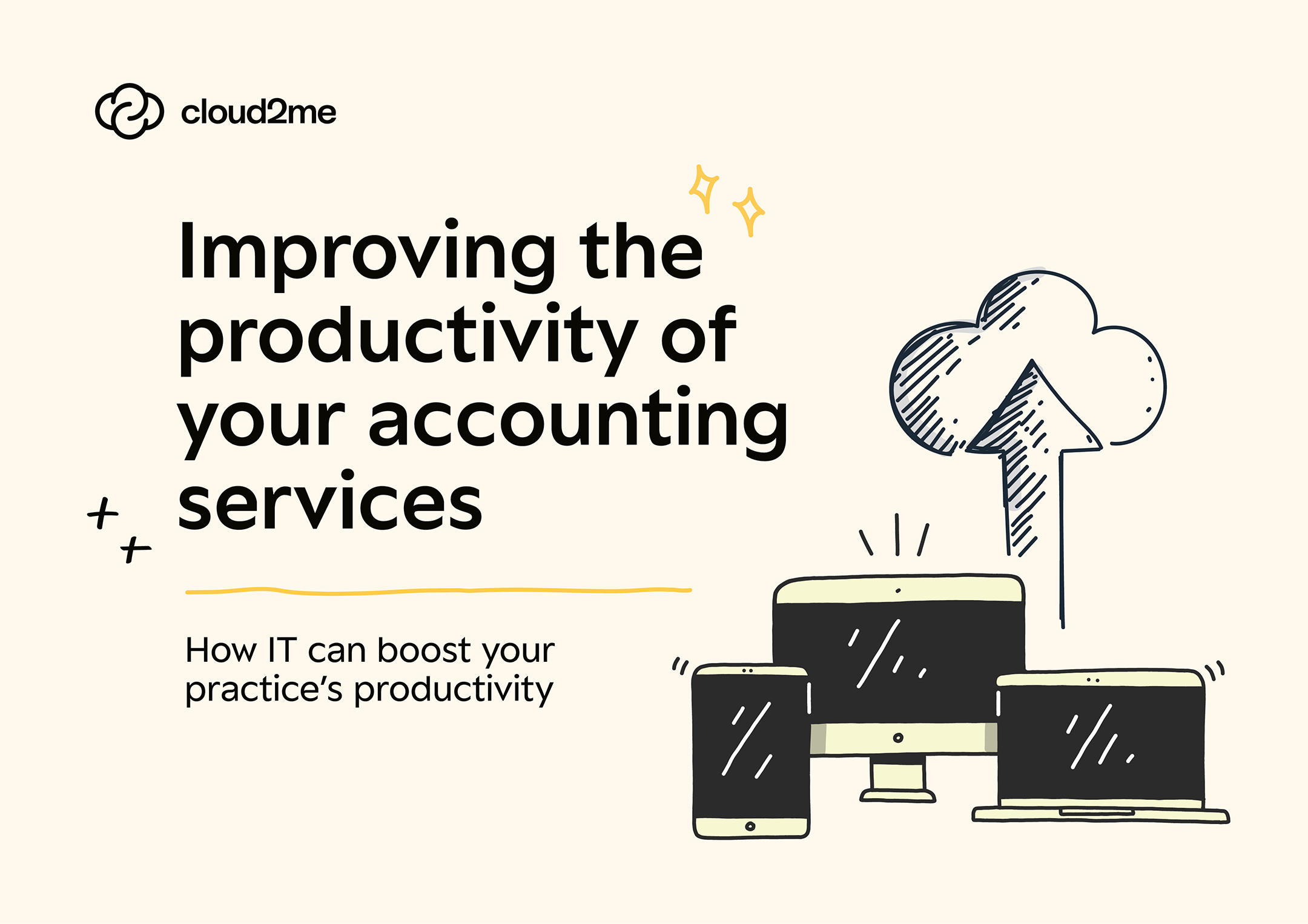When we talk to accountancy practices at conventions, we ask them a very simple question: “what’s holding you back?”. The top three responses to this question are:
- Finding new clients (a marketing challenge)
- Finding new staff (an HR challenge)
- Getting my software to work the way I want it to (an IT challenge)
While we can’t help you with the first two (though we can recommend some good marketing and HR companies we’ve come across), the third issue is something we most certainly can fix for you. Like electricity, when IT works, everyone takes it for granted – but the moment it fails, or even becomes intermittent, it’s a big problem. In this post we will explore how a hosted desktop solution can fix the most common IT challenges accountancy practices face today.
Services you offer (and we help support)
Because we only work with UK based accountancy practices here are some of the accounting services our customer provide, along with examples of the types of applications they’re running on our platform:
Auditing and Assurance Services involve statutory audits, internal audits, compliance audits, assurance services, and financial statement reviews. For these services, accountancy practices often use software like CaseWare, IDEA, and ACL, which help in automating audit processes, data analysis, and ensuring compliance.
Tax Services cover corporate and personal tax planning and compliance, VAT services, inheritance tax planning, and handling tax investigations and disputes. Software such as Thomson Reuters ONESOURCE, TaxCalc, and Sage Taxation are commonly used for managing tax computations, filings, and planning.
Accounting and Bookkeeping Services encompass the preparation of financial statements, management accounts, bookkeeping, payroll services, and outsourced accounting. Popular software includes QuickBooks, Xero, and Sage 50, which streamline bookkeeping, payroll processing, and financial reporting.
Corporate Finance Services involve mergers and acquisitions, business valuations, due diligence, financial modelling, and capital raising. Accountancy practices often use software such as DealCloud for managing M&A transactions, ValuSource for business valuations, and Excel for detailed financial modelling.
Wealth Management and Financial Planning services include investment planning, retirement planning, estate planning, and wealth preservation strategies. Software like Intuit Mint, Morningstar Advisor Workstation, and eMoney Advisor are used to create comprehensive financial plans and manage investments.
Company Secretarial Services cover company formation, corporate governance, compliance with Companies House requirements, and maintenance of statutory registers. Tools like Diligent, Inform Direct, and Blueprint OneWorld help manage corporate records, compliance, and governance.
IT and Systems Advisory Services include IT audits, ERP system implementation, cybersecurity advisory, and data analytics. Common software includes SAP and Oracle for ERP solutions, Nessus for cybersecurity assessments, and Splunk for data analytics and IT operations.
Sustainability and Environmental Reporting services involve sustainability reporting and assurance, environmental impact assessments, and corporate social responsibility reporting. Software like Sphera, Enablon, and EcoInvent are used to track and report environmental performance and sustainability metrics.
As well as the specialist applications mentioned here, there are a number of software providers such as IRIS, CCH and Digita who offer whole suites of applications that cover most, if not all of the services listed above.
Cloud vs Server Based Accounting Applications
Cloud-based accountancy applications are hosted on remote servers and accessed via the internet, offering significant advantages in terms of accessibility and scalability. Users can log in from any location with an internet connection, making it convenient for remote work and collaboration. These applications are typically maintained and updated by the service provider, ensuring users always have access to the latest features and security patches without needing to manage the underlying infrastructure.
In contrast, server-based accountancy applications are installed on local servers within an organisation’s premises. This setup provides greater control over data and infrastructure but requires significant IT resources to maintain and secure. Updates and backups need to be managed internally, which can be resource-intensive and may result in slower adoption of new features compared to cloud-based solutions. Server-based applications are often preferred by organisations with stringent data security requirements or those in locations with unreliable internet connectivity.
Why do small businesses use hosted desktop providers to run their server based applications?
Small business accountancy practices may choose to use a hosted desktop service to run their server-based applications primarily for the convenience and cost savings it offers. Hosted desktop services allow businesses to access their server-based applications from any location with an internet connection, similar to cloud-based solutions. This flexibility supports remote work and collaboration without the need for extensive on-site IT infrastructure, reducing capital expenditure on hardware and maintenance.
Hosted desktop services also provide robust security and reliability features that small businesses might struggle to implement on their own. These services typically include regular data backups, updates, and security measures managed by the hosting provider, ensuring that applications are secure, up-to-date, and less vulnerable to cyber threats. This outsourced IT management allows small businesses to focus on their core functions rather than IT maintenance, providing peace of mind and operational efficiency.
Finally, hosted desktop services offer scalability, allowing small business accountancy practices to easily adjust resources as their needs change. Whether they need to scale up during peak periods or scale down during slower times, hosted desktop solutions provide the flexibility to adapt without significant investment or disruption. This scalability, combined with the other benefits, makes hosted desktop services an attractive option for small businesses looking to leverage the advantages of server-based applications without the associated complexity and costs.
How Cloud2Me help small to medium sized accountancy practices deliver their accounting services more efficiently
A hosted desktop provider like Cloud2Me can significantly enhance the ability of an accountancy practice to deliver efficient and effective small business accounting services. By providing seamless access to online accounting software, Cloud2Me can ensure that accountancy practices can work from any location with an internet connection, enabling remote work and better client collaboration. This accessibility allows practices and their own dedicated accountants to manage and update annual accounts and other financial records in real-time, improving the overall client experience for small business owners.
Dedicated peak-time support is a key feature offered by Cloud2Me, ensuring that small businesses receive timely assistance during their busiest periods. This support can be crucial for small business owners who often need immediate help to address urgent accounting issues or software queries. With access to our team of IT professionals who specialise in business accounting software, small business accountants can resolve issues quickly, minimising downtime and allowing them to focus on delivering high-quality accounting services to their clients.
Cloud2Me can also apply software updates on all applications, ensuring they are always up-to-date with the latest features and security patches. This automation reduces the burden on small business owners and their own dedicated accountants, who would otherwise need to manually manage software updates themselves. By ensuring that the software is always current, Cloud2Me can help accountancy practices stay focused on day-to-day work which will drive their business forward.
Robust data privacy and security are paramount in the accounting industry, and Cloud2Me excels in this area. We implement advanced security measures, including encryption, multi-factor authentication, and regular security audits, to protect sensitive financial data. This robust security framework helps small business accounting practices comply with regulations and protect their clients’ information, fostering trust and confidence. Knowing their data is secure, small businesses can focus on their core operations without worrying about potential data breaches.
Seamless cloud integration is another significant benefit offered by hosted desktop providers, allowing for the easy integration of various business accounting tools and services. This integration ensures that all financial data is synchronised and accessible through a unified platform, making it easier for small business accountants to manage and analyse financial information. By leveraging cloud technology, Cloud2Me enables accountancy practices to maintain a comprehensive business archives, ensuring that all historical financial data is readily available for analysis, reporting, and compliance purposes.

